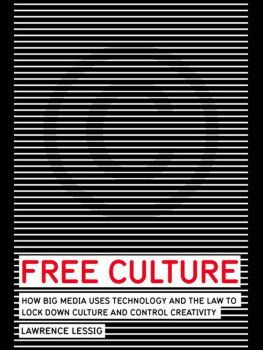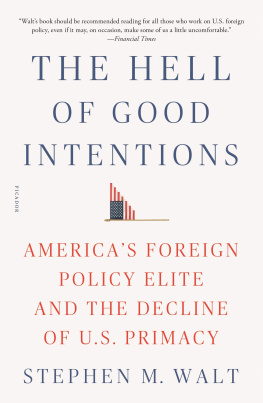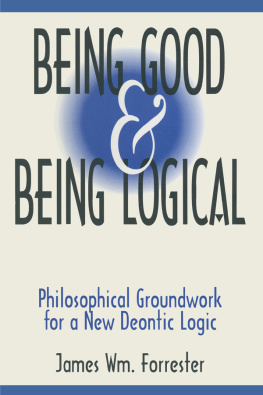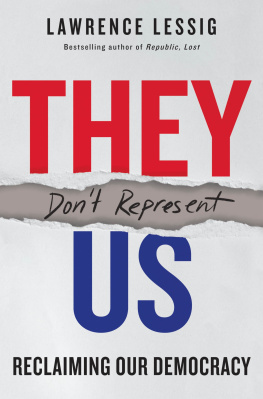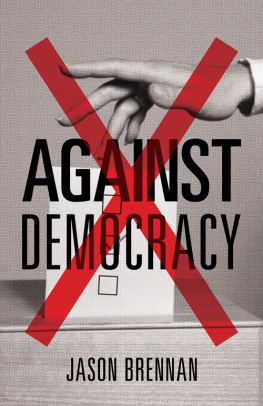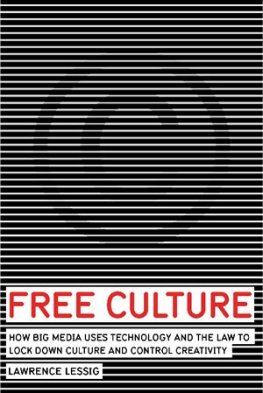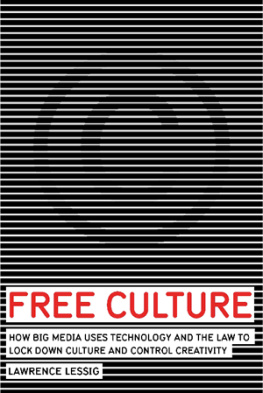Print edition published by Hachette Book Group, 237 Park Avenue, New York, NY 10017, http://www.HachetteBookGroup.com
This EPUB edition has been prepared by Omar Willey of The Seattle Star. Anything wonky is probably his fault. Email him at omar@seattlestar.net to complain.
CHAPTER 8
What the Tells Tell Us
When my colleagues and I tested whether apparent conflicts in the interests of professionals affected trust in the work of those doctors, researchers, and politicians, we didnt say that the apparent conflict was actually a conflict. We didnt tell the subjects that it actually affected the results, or that it was even reasonable to believe that it affected the results. People assumed it, and their confidence collapsed because of what they assumed.
When I described the conflict in research about the safety of BPA and cell phones, and linked that conflict to the source of funding, I didnt tell you that we had any good reason to believe this correlation proved anything. You assumed it, at least enough to weaken whatever confidence you had about whether those two products were safe.
In both cases, I needed only to point to the moneymoney in (what was perceived to be) the wrong placefor confidence to weaken. Not money, but money in the wrong place. Describe the architecture of incentives, and people will infer the causation. With no good reason, perhaps. But with a reliable regularity that cannot be denied, and certainly should not be ignored.
This same dynamic is true with each example of government policy that I have just described. Each is framed in a similar way: Given a fairly obvious public policy bias, actual policy was bent differently. Against free markets. Against efficient markets. Against effective education. Against safe financial markets. Why the policy was so bent, I didnt say. But after I round the story off in each case with an account of lobbying and campaign cash, you have a view about why. Or, at a minimum, you are less confident that the why has much to do with what makes good public policy sense.
These four examples are not small issues. Together, they have an effect. They confirm the view already held by the vast majority of Americans. In a poll commissioned for this book, 75 percent of Americans believe campaign contributions buy results in Congress. Three to one, with Republicans (71 percent) just as convinced of this as Democrats (81 percent). Puzzles plus money produce the view that the money explains the puzzles.
In a line: We dont trust our government. And until we create the conditions under which trust is possiblewhen, in other words, the presence of money in the wrong places doesnt inevitably make us doubtthis skepticism will remain. We cant help it. It will follow psychologically even if it doesnt follow logically.
But is the problem more than a problem of perception? Granted, the public reads the money as corruption. Is it corruption? Does it actually bend any results? If it doesnt, then maybe the problem is the perceiver and not what is perceived. Maybe the solution is a better understanding of the mechanisms of government, and why they ought to be trusted, rather than a radical change in how government gets funded. Maybe we, the people, are just confused?
CHAPTER 11
How So Damn Much Money Defeats the Left
n November 4, 2008, America voted to change its government. With the highest voter turnout in forty years, sixty-nine million Americans elected the first African American president, with twice as many electoral votes as his opponent, and almost ten million more of the total votes cast. House Democrats gained twenty-one seats, padding an already comfortable majority. And with the defection of one Republican, Senate Democrats gained enough seats to secure a filibuster-proof majority.
Obamas victory electrified the reform community. While no political liberal, his campaign had promised substantial change. Health care reformers were ecstatic to have a chance at real health care reform. Global warming activists thought they had elected a sexier version of Al Gore. And as Wall Streets collapse threw the economy over the cliff, America was very eager to hear Obama, the neo-Brandeisian, attack Wall Street. (I will take on the corruption in Washington and on Wall Street to make sure a crisis like this can never, ever happen again; ) If ever there was the opportunity for progressive change, this election seemed to promise it.
I was a strong supporter of Obama. Indeed, long before you likely had ever even heard the name Obama, I was a strong supporter of Obama. He was a colleague of mine at the University of Chicago. In 2000, Obama ran for Congress in the South Side of Chicago. The campaign was awful, yet after his defeat, Obama was optimistic. It was a good first try, he assured me. If that campaign was a good first try, I thought, then he had even less political sense than I.
Despite that defeat, however, I backed every Obama campaign since. In one sense, thats not surprising. We were friends. But it was more than that. Like many who know the man, I believed there was something more than the typical politician here. I was convinced by Obama. More than convinced: totally won over. It wasnt just that I agreed with his policies. Indeed, I didnt really agree with a bunch of his policieshes much more of a centrist on many issues than I. It was instead because I believed that he had a vision of what was wrong with our government, and a passion and commitment to fix it.
That vision is the great orators summary of the argument of this book. In speech after speech, Obama described the problem of Washington just as I have, though with a style that is much more compelling. As he said, the ways of Washington must change.
[I]f we do not change our politicsif we do not fundamentally change the way Washington worksthen the problems weve been talking about for the last generation will be the same ones that haunt us for generations to come.
But let me be clearthis isnt just about ending the failed policies of the Bush years; its about ending the failed system in Washington that produces those policies. For far too long, through both Democratic and Republican administrations, Washington has allowed Wall Street to use lobbyists and campaign contributions to rig the system and get its way, no matter what it costs ordinary Americans.
We are up against the belief that its all right for lobbyists to dominate our governmentthat they are just part of the system in Washington. But we know that the undue influence of lobbyists is part of the problem, and this election is our chance to say that were not going to let them stand in our way anymore.
[U]nless were willing to challenge the broken system in Washington, and stop letting lobbyists use their clout to get their way nothing else is going to change.
[T]he reason Im running for President is to challenge that system.
If were not willing to take up that fight, then real changechange that will make a lasting difference in the lives of ordinary Americanswill keep getting blocked by the defenders of the status quo.
It was this theme that distinguished Obama most clearly from the heir apparent to the Democratic nomination, Hillary Clinton. For Clinton was not running to change the way Washington works. She stood against John Edwards and Barack Obama in their attack on the system and on lobbyists in particular. As she told an audience at YearlyKos in August 2007: A lot of those lobbyists, whether you like it or not, represent real Americans. They represent nurses, they represent social workers, yes, they represent corporations that employ a lot of people. I dont think, based on my 35 years of fighting for what I believe in, I dont think anybody seriously believes Im going to be influenced by a lobbyist.


